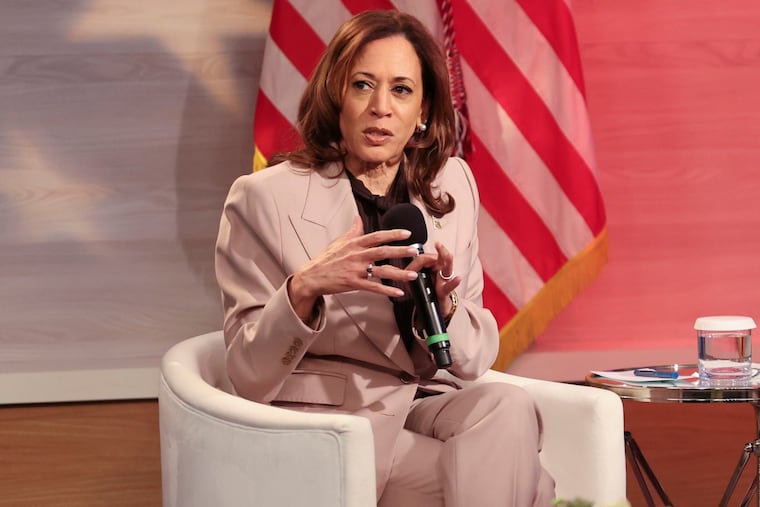Kamala Harris says she is ‘working to earn’ votes of Black men during wide-ranging NABJ interview in Philly
The vice president took questions for 45 minutes at an event that coincided with a White House conference on HBCUs.

Vice President Kamala Harris said Tuesday in Philadelphia that she isn’t treating Black male voters as a monolith amid signs that former President Donald Trump has made inroads with the demographic.
“I’m working to earn their vote, not assuming I’m going to have it because I’m Black,” Harris said during an interview with the National Association of Black Journalists.
It was one of her first live interviews since she became the Democratic standard-bearer following President Joe Biden’s decision to end his reelection campaign. Harris broke little new ground and offered few specifics on policy proposals when pressed by moderators. But she escaped the 45-minute event largely unscathed despite weeks of criticism about her avoiding unscripted interviews with journalists.
The event could not have been more different than Trump’s July sit-down with the same organization, in which he clashed with moderators and drew widespread criticism for questioning when Harris “became Black.” (Harris, whose mother is Indian and whose father is Jamaican, has long embraced both aspects of her heritage.)
Harris’ latest visit to Philadelphia came 49 days before Election Day in a race in which both candidates are targeting Pennsylvania as a must-win state.
Harris’ interview was hosted by WHYY and moderated by Gerren Gaynor of TheGrio television network, Eugene Daniels of Politico, and Tonya Mosley of NPR. Before an audience of NABJ members and students from historically Black colleges and universities, the vice president answered questions on topics ranging from job creation and abortion to the Israel-Hamas war and U.S. gun violence.
She reiterated her support for a ban on assault rifles, which are often used in high-profile mass shootings, and noted that she and her running mate, Minnesota Gov. Tim Walz, are both gun owners.
“We’re not trying to take any guns away from anyone, but we do need an assault weapons ban,” she said.
Asked which other policies she believed could address the epidemic of gun violence in the U.S. — where 59% of homicides and violent crimes are perpetrated with handguns — Harris acknowledged there are “very few solutions we haven’t thought of.”
She said universal background checks would help, although those would cover only legally purchased guns. She also stressed the need to end gun-show loopholes that allow dealers in some states to sell guns without performing background checks.
”I myself protested at a gun show 10, 15 years ago about the gun-show loophole and why we need to close that,” she said.
On the Israel-Hamas war, Daniels noted that Harris has been praised for emphasizing the humanity of Palestinians in her public statements on the issue. But he questioned whether there are any substantive differences between her approach and Biden’s, which progressive critics of the war have said has failed to hold Israel accountable.
“Is there a specific policy change as president that you would do?” he said.
Harris reiterated her support for a cease-fire agreement to end the bloodshed.
“We need to get this deal done, and we need to get it done immediately. That is my position and that is my policy,” Harris said, without articulating a difference between her plans and Biden’s policy.
Harris also addressed the apparent assassination attempt targeting Trump on Sunday, saying she spoke with him about the ordeal on Tuesday. The foiled plot was the second time Trump has been targeted by a gunman during the campaign, following his being shot in the ear during a July rally in Butler, Pa.
“I checked on him to see if he was OK, and I told him what I said publicly: ‘There’s no place for political violence in our country,’” Harris said.
Harris also addressed her own safety, especially in reference to an incident on Jan. 6, 2021, where a pipe bomb was found outside the Democratic National Committee headquarters while she was inside.
She said she feels confident in the ability of the Secret Service to protect her safety: “Yes, I feel safe. I have Secret Service protection,” she said.
But she then pivoted to saying that many other people feel unsafe because of GOP policies and rhetoric, such as LGBTQ residents who feel targeted by Republican state officials in Florida, and immigrants who have been the subject of false and demonizing anecdotes by Trump.
Harris said Trump’s repeatedly debunked false claims about Haitian immigrants eating pets in Springfield, Ohio, are “a crying shame.”
“I mean, my heart breaks for this community,” Harris said, citing how schools in Springfield had to be evacuated due to threats.
Trump has doubled down on anti-immigrant rhetoric, spreading falsehoods about towns including Charleroi, Pa., a small borough in Washington County.
”You cannot be entrusted with standing behind the seal of the president of the United States of America engaging in that hateful rhetoric that, as usual, is designed to divide us as a country,” Harris said.
Harris’ visit coincided with a four-day White House conference on HBCUs in Philadelphia, which Biden addressed the previous day.
Morgan State University senior Zakaiya Williams took a bus from Maryland to Philadelphia to see Harris speak Tuesday. Before the event began, she said she was most interested in Harris’ responses on the Israel-Hamas war.
After Harris spoke, Williams felt her response to questions about the conflict in Gaza fell flat.
“She didn’t answer as head-on as I thought she would,” Williams said.
Howard University senior Danilo Wrightsell said the campus is abuzz with support for Harris’ presidential campaign, which coincides with the anniversary of the historically Black university’s 100th homecoming. Harris is a Howard alum and pledged Alpha Kappa Alpha sorority at the school in 1986.
“A lot of people are really excited about her,” he said. “There’s a big thing of pride going on on campus.”